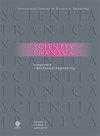Investments in energy efficiency with government environmental sensitiveness: An application of geometric programming and game theory
IF 1.9
4区 工程技术
Q2 ENGINEERING, MULTIDISCIPLINARY
引用次数: 0
Abstract
To maintain a competitive advantage, manufacturers of household appliances should promote the product’s energy efficiency, considering the impact on customer purchasing behavior. Since the product’s energy efficiency and pricing policies influence customers’ purchasing decisions, manufacturers confront significant challenges in balancing costs and demand since they must consider their profit-maximizing objective and government regulations. The Stackelberg game framework represents the interactions between the government, the leader, and a manufacturer, the follower, incorporating the government’s involvement in environmentally dependent social welfare under a tax structure. This paper proposes closed-form equilibrium using a game theory approach and geometric programming (GP) to solve the government’s and manufacturers’ non-linear decision models. The analytical results offer insight into the management’s approach to the product’s energy efficiency. The findings demonstrate that when clients’ concerns about energy-saving grow, the net payoff to the total manufacturer revenue ratio continuously decreases. The outcomes imply that the manufacturer must allocate significant revenue to tax expenditures in markets with more price-sensitive clients. As a motivation for research, this paper explores the application of the proposed model by examining a numerical example of a real-world refrigerator manufacturer case to obtain further managerial insight.能源效率投资与政府环境敏感性:几何规划和博弈论的应用
为了保持竞争优势,家电制造商应该考虑到对消费者购买行为的影响,提高产品的能效。由于产品的能源效率和定价政策影响消费者的购买决策,制造商在平衡成本和需求方面面临重大挑战,因为他们必须考虑利润最大化的目标和政府法规。Stackelberg博弈框架代表了政府(领导者)和制造商(追随者)之间的互动,其中包含了政府在税收结构下对环境依赖型社会福利的参与。本文利用博弈论方法和几何规划(GP),提出了一个封闭均衡模型来解决政府和制造商的非线性决策模型。分析结果提供了洞察管理的方法,以产品的能源效率。研究结果表明,当客户对节能的关注增加时,净收益占制造商总收入的比例不断降低。研究结果表明,在客户对价格更敏感的市场中,制造商必须将可观的收入分配给税收支出。作为研究的动机,本文通过研究现实世界冰箱制造商案例的数值示例来探索所提出模型的应用,以获得进一步的管理见解。
本文章由计算机程序翻译,如有差异,请以英文原文为准。
求助全文
约1分钟内获得全文
求助全文
来源期刊

Scientia Iranica
工程技术-工程:综合
CiteScore
2.90
自引率
7.10%
发文量
59
审稿时长
2 months
期刊介绍:
The objectives of Scientia Iranica are two-fold. The first is to provide a forum for the presentation of original works by scientists and engineers from around the world. The second is to open an effective channel to enhance the level of communication between scientists and engineers and the exchange of state-of-the-art research and ideas.
The scope of the journal is broad and multidisciplinary in technical sciences and engineering. It encompasses theoretical and experimental research. Specific areas include but not limited to chemistry, chemical engineering, civil engineering, control and computer engineering, electrical engineering, material, manufacturing and industrial management, mathematics, mechanical engineering, nuclear engineering, petroleum engineering, physics, nanotechnology.
 求助内容:
求助内容: 应助结果提醒方式:
应助结果提醒方式:


